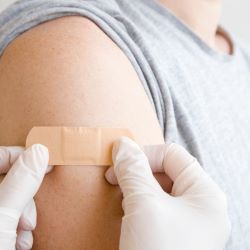Clinical Researcher—May 2020 (Volume 34, Issue 5)
PEER REVIEWED
Seema Garg, MS, MBA, CQA, CSSGB
In light of the current COVID-19 crisis, we are seeing an intense focus on the question of how soon we can make a vaccine available to protect the public from the novel SARS-CoV-2 coronavirus. Typically, developing a vaccine against any illness can take years and millions of dollars, and in some cases we still may not have complete success. For example, we have a vaccine for influenza, but it is not a universal vaccine; there is no vaccine for HIV, even after decades of research.
The last global pandemic was the 2009 H1N1 influenza (flu) pandemic. The first H1N1 case detected in United States was in April 2009, and by June 11 the World Health Organization (WHO) signaled that a global pandemic of H1N1 influenza was under way. On July 23, the U.S. Food and Drug Administration’s (FDA’s) Vaccine and Related Biological Advisory Committee indicated agreement with the agency’s proposal to license a H1N1 vaccine candidate via a “strain change” pathway, and this was only possible because already-approved influenza vaccines existed for other strains of influenza virus, which unfortunately is not the case with the current COVID-19 pandemic. On September 15, 2009, FDA approved four vaccine candidates for H1N1 influenza and on November 16, 2009, approval was granted for a fifth vaccine.{1}
So, what could expedite the development a vaccine against COVID-19? One tool in the research community’s toolbox is known as the human challenge trial (HCT). Open Orphan, a European clinical research organization, has launched a human coronavirus challenge study model aimed to guide and test the efficacy of new and existing vaccine candidates for COVID-19.{2}
Defining a Human Challenge Trial
According to the WHO, HCTs are “trials in which participants are intentionally challenged (whether or not they have been vaccinated) with an infectious disease organism. This challenge organism may be close to wild-type and pathogenic, adapted and/or attenuated from wild-type with less or no pathogenicity, or genetically modified in some manner.”{3}
Essentially, in a typical Phase I trial, new drugs or vaccines are tested in healthy volunteers to determine the safety of the investigational product; the subjects are only given the drug or the vaccine that is being studied—they are never intentionally administered the disease-causing agent. In the case of an HCT, the healthy volunteers are administered the disease-causing agent to study their reactions to it. Depending on the design of the HCT, the healthy volunteer may or may not be administered a protective drug or vaccine before or after administration of the disease-causing agent.
Why Conduct a Human Challenge Trial?
The purpose of an HCT is the same as that of animal challenge studies and models, with the added advantage of studying the potential drug/vaccine candidates directly in humans in a controlled environment. This allows the research community to screen potential drug/vaccine candidates and move the most promising candidates to larger trials.
The advantage of an HCT over an animal challenge study is the speed it offers for identifying a good drug/vaccine candidate. Typically, when drug/vaccine candidates are studied in several different species of animals, the results are extrapolated to how these drug/vaccine candidates can be effective in humans and then tested in volunteer participants.
Not all drug/vaccine candidates that show promise in animal studies produce successful results in Phase I studies. With an HCT, the effectiveness of a drug/vaccine candidates that shows promise can be determined much faster. The new drug/vaccine candidates still have to go through the routine Phase I, II, and III trials, but the speed of taking a drug/vaccine candidate from the lab to Phase I trials can be cut significantly with HCTs.
Are Human Challenge Trials Ethical?
Is it ethical to administer a healthy individual with disease-causing agent? After all, the Declaration of Helsinki states: “The health of my patient will be my first consideration”{4} and “While the primary purpose of medical research is to generate new knowledge, this goal can never take precedence over the rights and interests of individual research subjects.”{4}
By and large, the clinical research community has reached a consensus that, with proper oversight, it is ethical to conduct HCTs when they offer the greatest chance for rapid development of much-needed treatments. The argument is that HCTs can screen potentially effective drug/vaccine candidates in a much more controlled in-patient setting and with a much lower number of participants compared to routine testing in much larger populations. The early safety-determining advantages of this tactic extend into the somewhat less controlled environments of Phase II and III trials.{5}
So, one could argue that it is better to generate initial effectiveness data in small populations—and in a controlled setting—than to expose large populations to the potential drug/vaccine candidates in a less controlled environments. You might call this a “do less harm” kind of policy, and of course it can save time and money in critical healthcare situations.
What Do You Need to Conduct a Human Challenge Trial?
What you need to conduct an HCT depends on what kind of challenge agent is being studied. There are no special requirements as far as U.S. regulations are concerned, but there are many guidance documents on the topic issued by different agencies and regulatory bodies. The most prominent guidances are the ones issued by Centers of Disease Control (CDC) on the topic of infection control, since most challenge agents being studied will be infectious organisms.
Some of the guidance documents issued by the CDC are on general infection prevention and some are specific to the organisms/disease being handled. An important page to bookmark for these guidance documents is https://www.cdc.gov/infectioncontrol/guidelines/index.html.{6} You can find infection control guidelines on activities ranging from basic disinfection and handwashing to preventing the spread of influenza and Ebola.
It is important to keep in mind that guidances issued by the CDC are not specifically about the conduct of HCTs, but they are for infection control within healthcare settings when caring for confirmed cases, probable cases, and cases under investigation for infection. However, these guidances can be applied depending upon the exact nature of disease agent a Human Challenge Unit plans to study.
A Human Challenge Unit is essentially a healthcare facility that handles patients with diseases—the only difference is that the unit knows what challenge agent it is studying at any given time, whereas a hospital must be always prepared for all common infectious agents. The premise of having the processes and systems for infection control, however, will be the same for both facilities. Some of the systems and processes for infection control that both type of facilities needs to include are:
- Procedures for using personal protective equipment (PPE): gowning, gloving, masking before entering the areas where the infected patients/participants are housed and for de-gowning, de-gloving, and de-masking before the staff and/or other personnel leave these areas.{7}
- Procedures to disinfect or sterilize medical waste before it leaves the facility, including used PPE.{8}
- Procedures for movement in the facility: To reduce the potential for contamination, the facility should be designed for uni-directional movement; staff or patients/participants should move from low infection areas to high infection areas and not vice versa.{6}
- Procedures for environmental infection control: The cleaning and disinfection of all items used in the Challenge Unit, including bed rails, tables, chairs, and other items that tend to stay in participants’ rooms, and things that are more mobile, like laundry, service utensils, etc. Everything must be treated as a potential infection carrier.{9}
- Engineering controls: One of the most important infection control mechanism is the design of the facility and a facility’s ventilation system. There are many recommendations for how this should be done covering air flow, air exchanges, filters to be used in the ventilation systems, and whether the air should be re-circulated.{6}
All of this should be done based on what challenge agent the Challenge Unit plans to work with, so it is important to have agile facilities that can adapt to the different requirements of different organisms being studied. It is also important for the operational team to know the limits of its facilities and resources, and to never agree to study an organism that is incompatible with the biosafety level of the facilities. Know your expertise, but also know your limitations.
Current Regulatory Framework
Challenge agents that have been or are being studied around the world include viruses, toxins, allergens, bacteria, and fungi. Some examples include studies on cholera{10} and influenza.{11} Many of these studies are listed on https://www.clinicaltrials.gov/ct2/home.
In the United States, challenge agents are considered to be drugs, and therefore the FDA has jurisdiction over the challenge studies. However, in the United Kingdom and European Union, the regulatory authorities do not consider challenge agents to be drugs.{12}
The FDA has included human challenge studies in its Guidance for Development of Vaccines to Protect Against Global Infectious Diseases, but has mostly said that study sponsors should discuss their development plan with the Center for Biologics Evaluation and Research prior to initiation of such studies.{13}
References
- The 2009 H1N1 pandemic: Summary Highlights, April 2009–April 2010. https://www.cdc.gov/h1n1flu/cdcresponse.htm
- Open Orphan Launches World’s First Human Coronavirus Challenge Study. 2020. https://www.epmmagazine.com/news/worlds-first-human-coronavirus-challenge-study-model-launch/
- World Health Organization. 2016. Human Challenge Trials for Vaccine Development: Regulatory Considerations. https://formspal.com/pdf-forms/human-challenge-trials-ik-final/
- World Medical Association. 2013. WMA Declaration of Helsinki—Ethical Principles for Medical Research Involving Human Subjects. https://www.wma.net/policies-post/wma-declaration-of-helsinki-ethical-principles-for-medical-research-involving-human-subjects/
- Bambery B, Selgelid M, Weijer C, Savulescu J, Pollard A. 2016. Ethical Criteria for Human Challenge Studies in Infectious Diseases. Public Health Ethics 9(2). https://academic.oup.com/phe/article/9/2/92/2362760
- Centers for Disease Control and Prevention. CDC Infection Control Guideline Library. https://www.cdc.gov/infectioncontrol/guidelines/index.html
- 2007 Guideline for Isolation Precautions: Preventing Transmission of Infectious Agents in Healthcare Settings. https://www.cdc.gov/infectioncontrol/pdf/guidelines/isolation-guidelines-H.pdf
- Guideline for Disinfection and Sterilization in Healthcare Facilities, 2008. https://www.cdc.gov/infectioncontrol/pdf/guidelines/disinfection-guidelines-H.pdf
- Guidelines for Environmental Infection Control in Health-Care Facilities. https://www.cdc.gov/infectioncontrol/pdf/guidelines/environmental-guidelines-P.pdf
- Shirley D, McArthur M. The Utility of Human Challenge Studies in Vaccine Development: Lessons learned from Cholera. 2011. https://www.ncbi.nlm.nih.gov/pmc/articles/PMC3904492/
- Influenza human challenge study begins at NIH-sponsored clinical trial units. 2019. https://www.nih.gov/news-events/news-releases/influenza-human-challenge-study-begins-nih-sponsored-clinical-trial-units
- Catchpole A, Fullen D, Noulin N, Mann A, Gilbert A, Lanbkin-Williams R. 2018. The Manufacturing of Human Viral Challenge Agents for Use in Clinical Studies to Accelerate the Drug Development Process. BMC Research Notes 22:620. https://bmcresnotes.biomedcentral.com/articles/10.1186/s13104-018-3636-7
- Guidance for Industry: General Principles for the Development of Vaccines to Protect Against Global Infectious Diseases. 2011. https://www.fda.gov/files/vaccines,%20blood%20&%20biologics/published/Guidance-for-Industry–General-Principles-for-the-Development-of-Vaccines-to-Protect-Against-Global-Infectious-Diseases.pdf

Seema Garg, MS, MBA, CQA, CSSGB, is a Principal Quality Assurance Auditor in Ashburn, Va.



